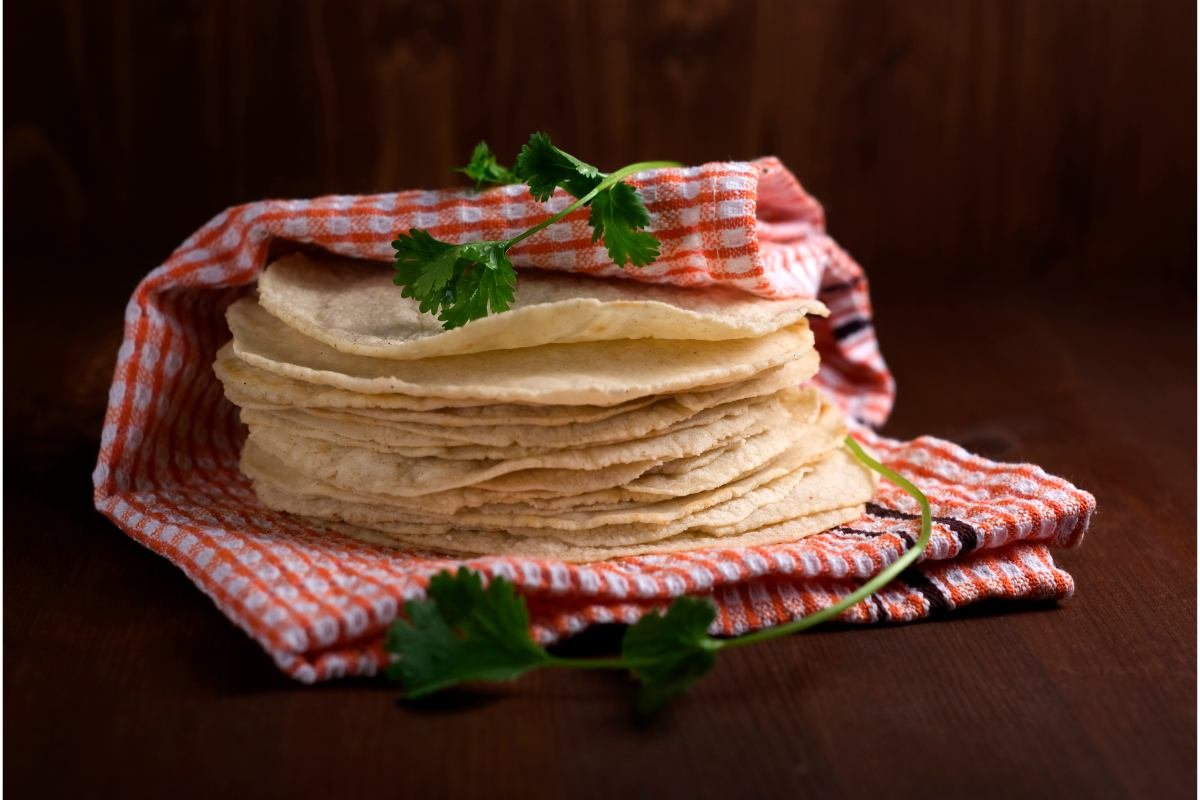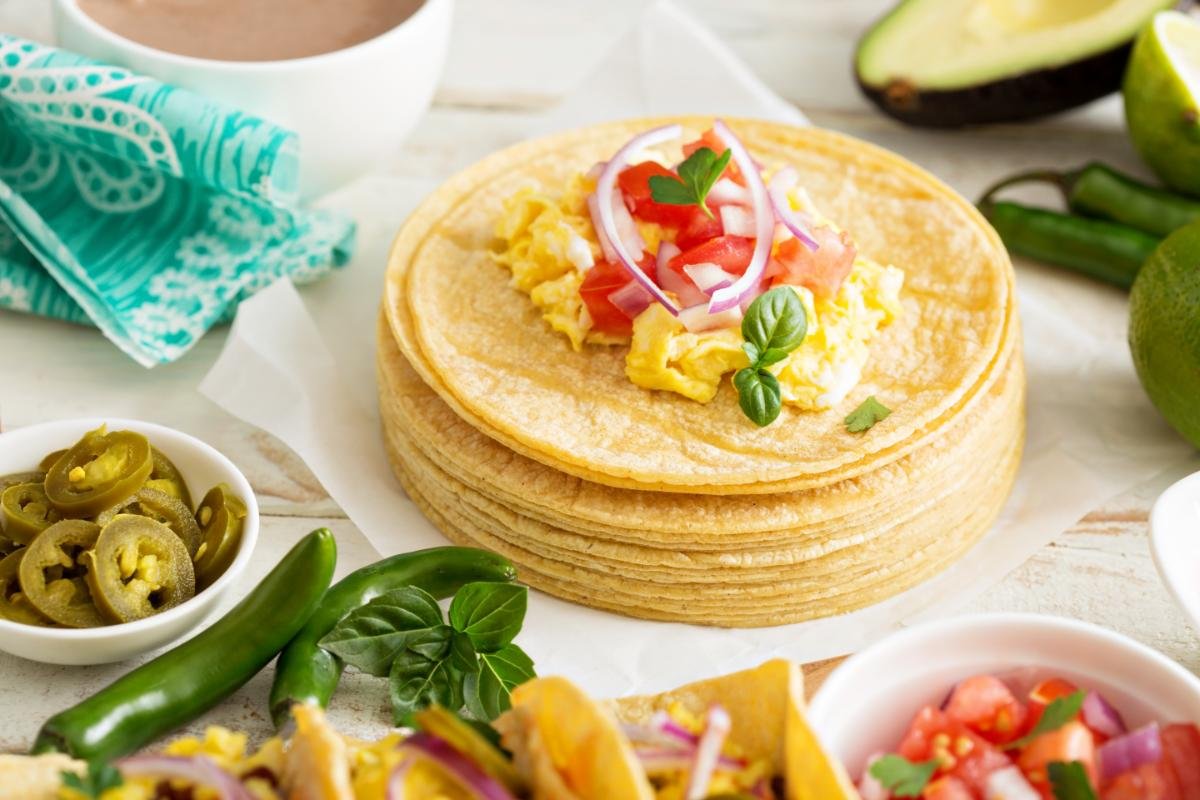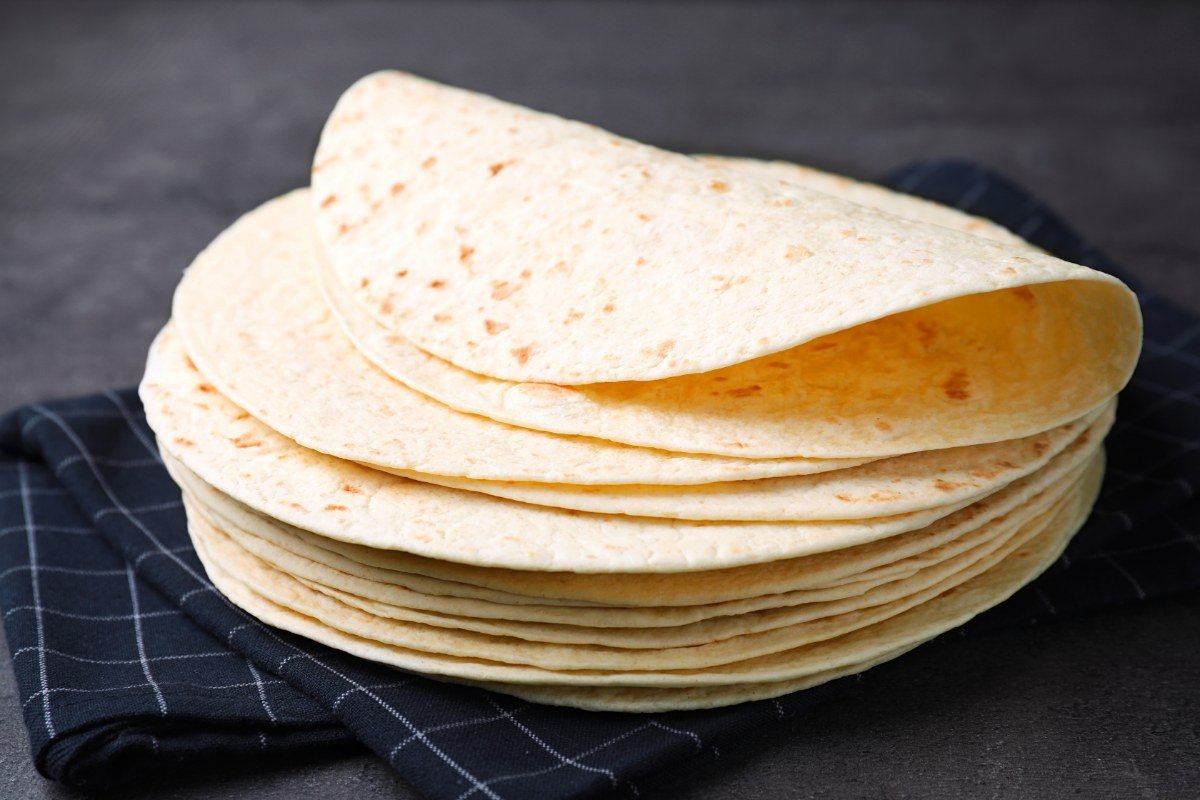Gluten-free diets have increasingly become a part of the dietary considerations for many individuals around the world, either by choice or due to health-related necessities. Among the myriad of foods scrutinized for their gluten content, corn tortillas stand out as a popular staple in many cuisines, raising the question of their compatibility with gluten-free lifestyles. This blog aims to explore whether corn tortillas are indeed gluten-free, delving into their composition, benefits, and how they fit into a gluten-free diet. As we navigate through the intricacies of gluten, corn tortillas, and the dietary needs they may or may not meet, our goal is to provide you with comprehensive insights and practical advice on incorporating corn tortillas into your gluten-free eating habits.
What is Gluten?
Gluten is a family of proteins found primarily in wheat, barley, and rye. It acts as a binder, holding food together and giving it a stretchy quality, which is particularly appreciated in bread and other bakery products. However, for individuals with celiac disease, gluten sensitivity, or wheat allergies, consuming gluten can lead to serious health issues, ranging from intestinal damage to nutritional deficiencies and beyond. This has led to a surge in the demand for gluten-free products, as people strive to maintain their health without sacrificing the pleasures of eating. Understanding gluten and its effects is the first step towards navigating a diet that excludes it, paving the way for alternatives like corn tortillas to take center stage for those seeking gluten-free options.
Corn Tortillas: An Overview

Corn tortillas, a staple in Mexican cuisine and beyond, have a rich history and a simple yet versatile recipe that caters to various dietary needs, including those of individuals following a gluten-free diet. This section delves into the cultural significance, basic ingredients, and the traditional preparation methods of corn tortillas, highlighting their role in a gluten-free diet.
The Cultural Significance of Corn Tortillas
Corn tortillas date back thousands of years, with their origins deeply rooted in the indigenous cultures of Mesoamerica. These cultures revered maize (corn) not only as a fundamental part of their diet but also as a sacred element integral to their creation myths and rituals. Today, corn tortillas continue to be a cornerstone of Mexican cuisine, integral to dishes such as tacos, enchiladas, and quesadillas, and celebrated for their nutritional value, simplicity, and flavor.
Basic Ingredients and Their Gluten-Free Nature
Traditionally, corn tortillas contain only two essential ingredients: masa harina (a type of corn flour) and water. Masa harina is made by soaking dried corn in a lime water solution, then grinding it into a fine flour. This process, known as nixtamalization, not only enhances the nutritional profile of the corn but also imparts a distinctive flavor to the tortillas. Importantly for those on a gluten-free diet, this process ensures that the primary ingredient of corn tortillas is naturally free of gluten, making them a safe and enjoyable option for those avoiding gluten.
Traditional Preparation Methods
Making corn tortillas involves mixing masa harina with water to form a dough, then pressing the dough into thin rounds and cooking them on a hot surface. This method has remained largely unchanged for centuries, emphasizing the tortilla’s simplicity and the ease with which it can be incorporated into a gluten-free diet. The cooking process involves briefly grilling each tortilla on a hot comal (griddle) until it is cooked through and slightly charred, imparting a unique flavor and texture that is characteristic of authentic corn tortillas.
The Role of Corn Tortillas in a Gluten-Free Diet
Corn tortillas offer a versatile, nutritious option for those following a gluten-free diet. Rich in complex carbohydrates and fiber, they provide a satisfying and energy-rich base for a variety of meals without the risk of gluten exposure. Their simplicity and natural ingredients also make corn tortillas an ideal choice for those seeking whole, unprocessed foods as part of a healthy, gluten-free lifestyle.
The Gluten Content in Corn Tortillas

Corn tortillas are celebrated for their simplicity and natural ingredients, which inherently exclude gluten, making them a favored option for individuals following a gluten-free diet. This section will explore the gluten content in corn tortillas, examining how they are made to be gluten-free, potential risks of cross-contamination, and what to look for to ensure they are safe for a gluten-free diet.
Naturally Gluten-Free Composition
Corn tortillas are inherently gluten-free due to their simple composition of masa harina and water. Masa harina, processed from nixtamalized corn, does not contain gluten, a protein found in wheat, barley, and rye. This natural absence of gluten makes corn tortillas a safe and appealing choice for those with celiac disease, gluten sensitivity, or anyone following a gluten-free lifestyle, allowing them to enjoy the rich flavors and versatility of tortillas without health concerns.
Cross-Contamination Risks in Manufacturing
While corn tortillas are gluten-free by nature, the risk of cross-contamination during manufacturing is a valid concern. Facilities that process products containing gluten may inadvertently introduce gluten to corn tortillas through shared equipment or close proximity. This contamination can pose a serious risk to individuals with celiac disease or gluten sensitivity, turning an otherwise safe food into a potential hazard.
To mitigate this risk, many manufacturers now produce corn tortillas in dedicated gluten-free facilities or implement strict protocols to prevent cross-contamination. For consumers, this means being vigilant about reading labels and choosing products that are certified gluten-free, ensuring the corn tortillas they consume are indeed safe and free from gluten.
Choosing Safe, Gluten-Free Corn Tortillas
When selecting corn tortillas, individuals following a gluten-free diet should look for products that carry a gluten-free certification. These certifications indicate that the product has undergone testing and meets strict standards for gluten content, offering an added layer of assurance beyond ingredient lists. Additionally, researching brands and their manufacturing practices can provide insight into their commitment to producing truly gluten-free products, helping consumers make informed choices and avoid accidental gluten exposure.
Benefits of Gluten-Free Corn Tortillas
Gluten-free corn tortillas are more than just a safe alternative for those avoiding gluten; they offer a range of nutritional benefits and culinary versatility that enhances any gluten-free diet. This section highlights the nutritional advantages of corn tortillas and their wide-ranging use in recipes, underscoring why they are a beneficial addition to a gluten-free lifestyle.
Nutritional Advantages of Corn Tortillas
Corn tortillas are a nutrient-rich option that contributes to a balanced gluten-free diet. They are naturally low in fat and calories, making them a suitable choice for weight management. Additionally, corn tortillas provide essential minerals such as magnesium and potassium, which are vital for maintaining heart health and regulating blood pressure. The presence of dietary fiber in corn tortillas aids in digestion and promotes a feeling of fullness, reducing the overall calorie intake. Moreover, the nixtamalization process increases the bioavailability of niacin (vitamin B3), enhancing nutritional value and preventing deficiencies.
Versatility in Gluten-Free Recipes
One of the most compelling benefits of corn tortillas is their remarkable versatility in the kitchen. They can be used in a plethora of gluten-free recipes, ranging from traditional Mexican dishes like tacos and enchiladas to innovative creations such as tortilla-based pizzas, wraps, and even dessert quesadillas. Their neutral flavor profile allows them to pair well with a wide array of ingredients, making them an indispensable tool for creative and diverse gluten-free cooking. Additionally, corn tortillas can be cut and fried to make homemade chips for dipping or used as a gluten-free breadcrumb alternative when ground, offering endless possibilities for gluten-free meal preparation.
Enhancing Gluten-Free Diets with Corn Tortillas
Incorporating corn tortillas into a gluten-free diet not only ensures adherence to dietary restrictions but also enriches the diet with enjoyable and nutritious options. They serve as an excellent base for meals, providing energy without the risk of gluten exposure. For those looking to diversify their gluten-free diet, corn tortillas offer a convenient and healthy foundation for experimenting with different flavors and ingredients, encouraging a more varied and satisfying dietary experience.
Identifying Gluten-Free Corn Tortillas
For individuals navigating a gluten-free lifestyle, identifying truly gluten-free corn tortillas is crucial to maintaining their health and well-being. This section provides practical tips for reading labels, understanding certifications, and selecting brands that are trustworthy and committed to producing safe, gluten-free products.
Reading Labels Carefully
The first step in ensuring the corn tortillas you purchase are gluten-free is to read the product labels meticulously. Ingredients to watch for include wheat, barley, rye, or any derivatives of these grains that contain gluten. Additionally, look for any disclaimers regarding shared equipment or facilities that also process gluten-containing products, as these can indicate a risk of cross-contamination. Products labeled as “gluten-free” should have less than 20 parts per million (ppm) of gluten, the standard threshold for gluten-free certification in many countries.
Importance of Gluten-Free Certification
Gluten-free certifications are a reliable indicator that a product has been tested and meets strict gluten-free standards. These certifications, often represented by a symbol on the packaging, signify that the product undergoes regular testing and adheres to procedures that minimize the risk of cross-contamination. When choosing corn tortillas, prioritize those with a recognized gluten-free certification, as this provides an added layer of assurance beyond the ingredient list alone.
Trustworthy Brands and Manufacturer Practices
Researching brands and their manufacturing practices can offer valuable insights into their commitment to gluten-free products. Many reputable brands dedicated to producing gluten-free corn tortillas will openly share information about their manufacturing processes, including the use of dedicated gluten-free facilities or stringent cross-contamination protocols. Engaging with customer service or exploring brand websites can reveal the measures taken to ensure the safety and integrity of their gluten-free products. Opting for brands with a strong reputation for gluten-free offerings can further safeguard against accidental gluten exposure.
Making Your Own Gluten-Free Corn Tortillas
Crafting homemade gluten-free corn tortillas is a rewarding process that ensures you know exactly what goes into your food. This minimizes the risk of cross-contamination and allows for customization to suit personal taste preferences. Follow this guide for a simple recipe and tips to keep your kitchen gluten-free friendly.
Simple Gluten-Free Corn Tortilla Recipe
You need minimal ingredients and equipment to create your own corn tortillas, making this an accessible option for anyone with a kitchen. Here’s how to get started:
- Ingredients:
- 2 cups of masa harina (ensure it’s labeled gluten-free)
- 1.5 to 2 cups of warm water
- A pinch of salt (optional)
- Equipment:
- Mixing bowl
- Tortilla press or rolling pin
- Cast iron skillet or non-stick pan
- Instructions:
- Combine the masa harina with salt in a mixing bowl. Gradually mix in warm water until the dough forms a firm yet pliable consistency.
- Form the dough into small balls, about the size of a golf ball.
- Press a dough ball between two pieces of plastic wrap using a tortilla press or roll it into a circle with a rolling pin.
- Cook each tortilla on a dry skillet over medium-high heat for about 1 minute on each side or until light brown spots appear.
- Keep the cooked tortillas wrapped in a clean cloth to stay warm.
Tips for a Gluten-Free Friendly Kitchen
Keeping your kitchen gluten-free is key to ensuring your homemade corn tortillas remain safe to eat. Here’s how to do it:
- Dedicate areas and utensils for gluten-free cooking: Use specific areas and utensils for gluten-free food preparation to avoid cross-contamination.
- Choose gluten-free ingredients: Make sure all ingredients, including masa harina, are certified gluten-free.
- Clean regularly: Before and after preparing gluten-free meals, clean surfaces, utensils, and equipment to remove any gluten residues.
Customizing Your Tortillas
Homemade corn tortillas allow for thickness, size, and flavor adjustments. Try adding herbs, spices, or vegetable juices like beet or spinach to the dough for colorful and flavorful variations. This not only adds a personal touch but can also enhance the nutritional value of your tortillas.
Section 8: Common Mistakes to Avoid
Adopting a gluten-free diet, especially when including products like corn tortillas, involves avoiding mistakes that could affect your health or dietary choices. This section outlines common pitfalls and how to avoid them, ensuring a safe and enjoyable gluten-free lifestyle.
Assuming All Corn Tortillas Are Gluten-Free
Assuming that all corn tortillas are inherently gluten-free is a prevalent mistake. Cross-contamination during processing or added ingredients can introduce gluten into corn tortillas. Always check labels for gluten-free certification and watch for disclaimers about shared facilities.
Overlooking Cross-Contamination at Home
Underestimating the risk of cross-contamination in your own kitchen is another oversight. Using the same utensils and surfaces for gluten-free and gluten-containing foods can lead to unintentional gluten exposure. Implement strict kitchen hygiene, like using separate cooking tools for gluten-free foods and cleaning surfaces thoroughly.
Neglecting Nutritional Balance
Choosing gluten-free options without considering their nutritional value can lead to an unbalanced diet. Some gluten-free products, including corn tortillas, might be high in calories and low in essential nutrients. Opt for nutrient-dense alternatives and balance your diet with a variety of foods to ensure a full spectrum of nutrients.
Ignoring Symptoms of Gluten Exposure
Ignoring symptoms of accidental gluten exposure can have long-term health implications for those with celiac disease or gluten sensitivity. Symptoms like digestive discomfort or fatigue after eating should prompt a review of recent food choices and kitchen practices to identify potential sources of contamination.
Frequently Asked Questions
Below, you’ll find responses to some of the most commonly asked questions about corn tortillas and gluten-free diets, aimed at providing quick and informative answers to help guide your gluten-free journey.
Are all corn tortillas gluten-free?
While corn itself naturally does not contain gluten, not all corn tortillas automatically qualify as gluten-free. Cross-contamination during processing or the addition of ingredients containing gluten can introduce gluten into corn tortillas. Always read labels for gluten-free certification and look out for any warnings about shared facilities.
How can I prevent cross-contamination when making corn tortillas at home?
To prevent cross-contamination, dedicate specific utensils, cookware, and surfaces exclusively for gluten-free cooking. Make sure to clean your kitchen thoroughly before and after preparing gluten-free meals, and keep gluten-free ingredients separate from those containing gluten.
Can people with celiac disease eat corn tortillas?
Yes, people with celiac disease can safely eat corn tortillas, as long as they are labeled gluten-free and have not come into contact with gluten during processing or preparation. It’s always important to verify the gluten-free status of corn tortillas before eating them.
What are some gluten-free alternatives to corn tortillas?
In addition to corn tortillas, you can use lettuce wraps, rice paper rolls, and tortillas made from gluten-free grains such as quinoa, buckwheat, or rice flour as gluten-free alternatives. These options offer variety and can complement different meals within a gluten-free diet.
How can I identify a corn tortilla that is certified gluten-free?
Look for a seal or logo from a recognized gluten-free certification organization on the packaging. This certification indicates the product has undergone testing and adheres to strict gluten-free standards, offering assurance beyond the ingredient list.
Do gluten-free corn tortillas taste different than regular corn tortillas?
Gluten-free corn tortillas, made from traditional ingredients like masa harina and water, should taste very similar to regular corn tortillas. The absence of gluten doesn’t significantly affect the taste but may slightly alter the texture.
Where can I find gluten-free corn tortilla recipes?
For a wide range of gluten-free corn tortilla recipes, from traditional favorites to innovative new ideas, check out RecipesZap.com. This site offers numerous recipes designed for those following a gluten-free diet.
Conclusion
Navigating a gluten-free diet, especially with corn tortillas as a staple, opens up both opportunities and challenges. Through this exploration, we’ve seen that corn tortillas can enrich a gluten-free lifestyle when chosen and prepared with attention to detail. Understanding the ins and outs of gluten, recognizing potential sources of cross-contamination, and selecting products carefully allows individuals to enjoy the cultural heritage and versatility of corn tortillas without health concerns.
For those eager to broaden their gluten-free meal options, homemade recipes that feature corn tortillas can inspire your next culinary creation. From traditional dishes to innovative takes, RecipesZap.com offers an abundance of gluten-free recipes that make the most of corn tortillas, providing delicious inspiration for your meals.
Moreover, for additional insights on gluten-free living and the latest research, the Celiac Disease Foundation stands as a valuable resource. It offers guidance, support, and education for navigating a gluten-free lifestyle effectively.
Embracing a gluten-free diet doesn’t mean you have to give up on flavor or diversity in your meals. Armed with the right knowledge and resources, corn tortillas can remain a cherished and safe choice for those avoiding gluten, enhancing your diet with their simplicity, nutritional benefits, and endless culinary possibilities.

